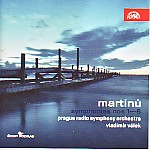Something strange has happened to Vladimir Válek. His formerly admirable emphasis on clean rhythm has degenerated into a generalized stiffness, most evident in his recent dreadful Dvorák symphony cycle. Here the problem isn’t so bad. True, his tempos tend to be leisurely, but Martinu’s perpetually syncopated lines are seldom marked to be played all that quickly, and his busy textures benefit from being given time to register. Note, for example, the clarity of woodwind detail, even in the most thickly scored moments of the First Symphony, or Válek’s clear-eyed directness in the latter stages of the Third symphony’s finale.
On the other hand, in the Fourth and Fifth symphonies, especially in their finales, Válek’s fatally stiff handling of rhythm rears its ugly head at particularly dreary tempos. The finale of the Fifth, which makes much of the same dotted rhythm that characterizes the first movement of Beethoven’s Seventh, fails to generate anything like the necessary excitement. Also, as with the Dvorák cycle, the sonics are very dry and studio-bound, with attenuated bass frequencies and recessed brass and percussion. If Symphonies 1, 2, 3, and 6 were released separately, they might be worth considering, but taken as a cycle you can do much better from the likes of Bryden Thomson on Chandos (his finest work on disc), or Arthur Fagen on Naxos.
































